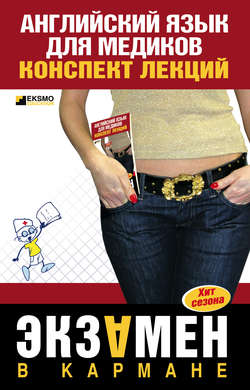Читать книгу Английский язык для медиков: конспект лекций - Группа авторов - Страница 7
ЛЕКЦИЯ № 6. Matter
ОглавлениеMatter is anything that occupies space, possesses mass and can be perceived by our sense organs. It exists in nature in three, usually inter convertible physical states: solids, liquids and gases. For instance, ice, water and steam are respectively the solid, liquid and gaseous states of water. Things in the physical world are made up of a relatively small number of basic materials combined in various ways. The physical material of which everything that we can see or touch is made is matter. Matter exists in three different states: solid, liquid and gaseous. Human senses with the help of tools allow us to determine the properties of matter. Matter can undergo a variety of changes – physical and chemical, natural and controlled.
Chemistry and physics deal with the study of matter, its properties, changes and transformation with energy. There are two kinds of properties: physical – colour, taste, odour, density, hardness, solubility and ability to conduct electricity and heat; in solids the shape of their crystals is significant, freezing and boiling points of liquids.
Chemical properties are the changes in composition undergone by a substance when it is subjected to various conditions. The various changes may be physical and chemical. The physical properties are temporary. In a chemical change the composition of the substance is changed and new products are formed. Chemical properties are permanent.
It is useful to classify materials as solid, liquid or gas (though water, for example, exists as solid (ice), as liquid (water) and as gas (water vapour). The changes of state described by the terms solidify (freeze), liquify (melt), vapourise (evaporate) and condense are examples of physical changes. After physical change there is still the same material. Water is water whether it is solid, liquid or gas. Also, there is still the same mass of material. It is usually easy to reverse a physical change.
New words
matter – материя
anything – все
to occupy – занимать
space – пространство
to possesses – владеть, обладать
mass – масса
sense – чувство
organ – орган
steam – пар
to exist – существовать
can – мочь
to undergo – подвергать
variety – разнообрзие
change – перемена
physical – физический
chemical – химический
natural – природный
transformation – трансформация
colour – цвет
taste – вкус
odour – запах
density – плотность
hardness – твердость
solubility – растворимость
ability – возможность
to conduct – проводить
permanent – постоянный
Существует огромное количество так называемых застывших словосочетаний, в которых артикль употребляется или отсутствует традиционно. Эти словосочетания приходится заучивать наизусть.
Запомните следующие конструкции.
There is a…
Where is the…?
Запомните также следующие предложения.
The (book) is on the (table).
Ho: The (book) is on a little (table).
Вставьте артикль, где необходимо.
1. Where is… soup? -… soup is in… big saucepan on… gas-cooker.
2. Where are… cut lets? -… cutlets are in… refrigerator on… lit tle plate.
3. There is no… bread on… table. Where In… bread?
4. There is… little brown coffee-table in our… room in… front of… sofa.
5. Where is… table in your… room?
6. There is… thick carpet on… floor in my mother's room.
7. Is your brother at… home? – No, he is at… work. He works at… big factory. He is… engineer.
8. My sister has many… books… books are in… big bookcase.
9… weather is fine today. Let's go and play in… yard.
10. There are many… children in… yard. They are playing with… ball.
11. Where is… cat? -… cat is on… sofa.
12. Where is… book? -… book is on… shelf.
13. Where are… flowers? -… flowers are in… beautiful vase.
14. Where is… vase? -… vase is on… little table near… window.
15. Open… win dow, please… weather is fine today.
16. I can see… sun in… sky. I can see… nice little bird… bird is sitting in… big tree… tree is green.
17. There is… little white cloud in… sky.
18. We have. large room.
19. There is… big sofa in… room and… little lamp on… wall over… sofa.
20. I like to sit on… sofa and read… good book.
Answer the questions.
1. What is matter?
2. What does matter occupy?
3. Where does matter exist?
4. What are things in the physical world made up of?
5. What states does matter exist in?
6. What can matter undergo?
7. How many kinds of properties are there?
8. Are chemical properties permanent?
9. What may the various changes be?
10. Is it easy to reverse a physical change?
Make the sentences of your own using the new words (10 sentences).
Find the definite and indefinite articles in the text.
Find one word, which is a little bit different in meaning from others (найдите одно слово, которое немного отличается от других по смыслу):
1) a) nothing; b) anything; c) everything;
2) a) sense; b) feeling; c) gas;
3) a) ring; b) odour; c) taste;
4) a) colour; b) green; c) table;
5) a) feet; b) arms; c) molecule.
